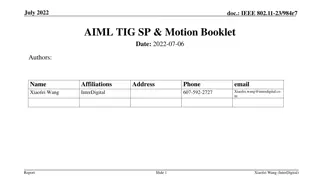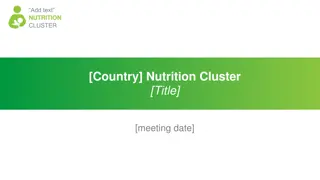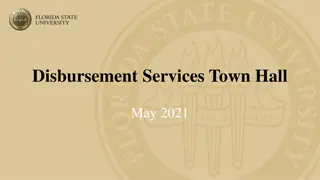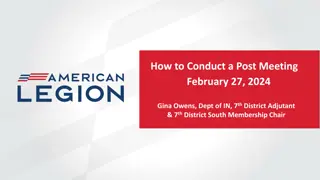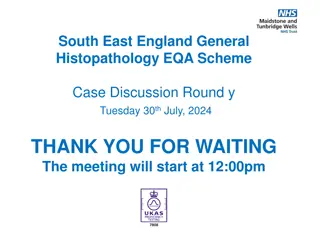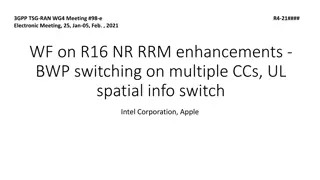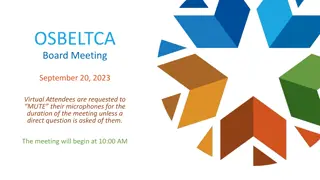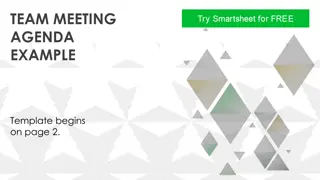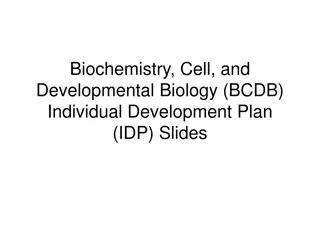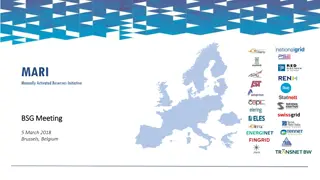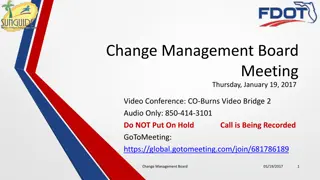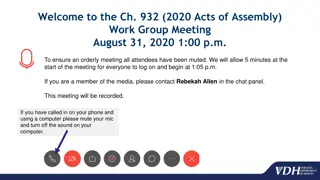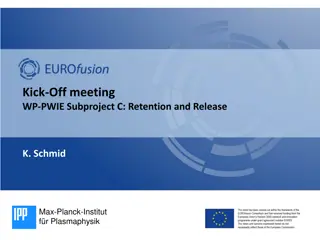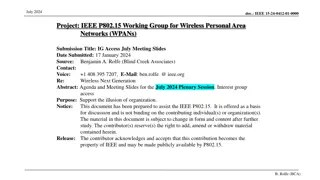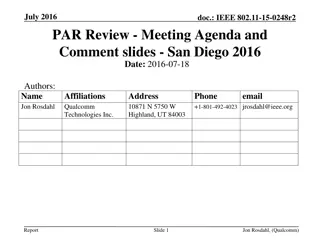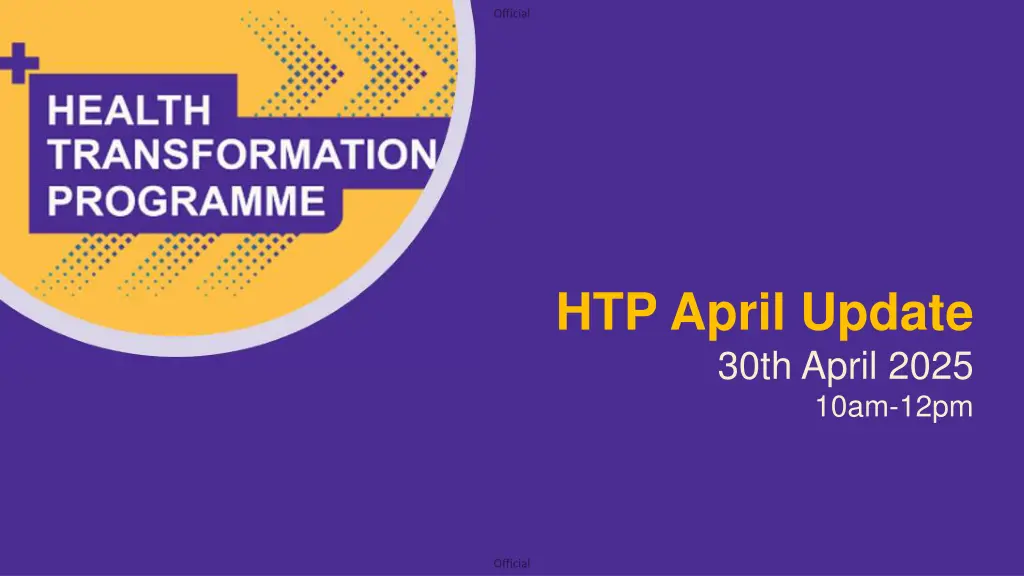
Health Transformation Programme Overview and Updates
"Explore the latest updates and overview of the Health Transformation Programme (HTP) with a focus on transformed case management, employment support, occupational therapist intervention, and key strategic outcomes. Discover how HTP is revolutionizing systems, processes, and people to provide a more personalized and efficient service for customers."
Download Presentation

Please find below an Image/Link to download the presentation.
The content on the website is provided AS IS for your information and personal use only. It may not be sold, licensed, or shared on other websites without obtaining consent from the author. If you encounter any issues during the download, it is possible that the publisher has removed the file from their server.
You are allowed to download the files provided on this website for personal or commercial use, subject to the condition that they are used lawfully. All files are the property of their respective owners.
The content on the website is provided AS IS for your information and personal use only. It may not be sold, licensed, or shared on other websites without obtaining consent from the author.
E N D
Presentation Transcript
HTP April Update 30th April 2025 10am-12pm
Agenda Introduction HTP Overview Transformed Case Management Update Employment Support Occupational Therapist Intervention Questions
HTP Overview Systems Processes People
HTP Overview SYSTEMS Developing two new IT systems from scratch entire application and assessment process o Engaging with our colleagues and stakeholders to gain insights from the people that support those with health conditions and disabilities every day. PROCESSES Rethinking the PEOPLE Bringing our colleagues with us o the New PIP Service to replace PIPCS, used by DWP staff to process PIP claims; and exploring how we can provide more tailored, personal support. o Introducing online applications as an additional option for the PIP process, and Systems Processes o a Health Assessment Service (HAS) IT platform to deliver all health assessments on a single digital platform. already holds, tailoring assessments and only conducting them if necessary. support our most vulnerable customers when it really matters. o Reducing the burden of health assessments by using information DWP colleagues have more capacity to o Enabling efficiencies so that our o Focusing on making the right decision first time and explaining it as clearly as possible - reducing the need for customers to request MR/appeal. People o Motivating colleagues on the far better service they will be part of
Health Transformation Programme Overview The HTP has 5 Strategic Outcomes:
Transformed Case Management Recap
Reminder - the current service Customer submits PIP Claim Task is created and the case is sent straight to an HCP for assessment Assessment is completed, case is sent back to DWP for decision to be made and decision sent to customer
What we want to offer A more personal service Case Managers deciding if an assessment is necessary Options for greater support through the process Quality and timely decisions being made first time
Case Management Approach Standard Support Journey Case Manager (CM) is allocated. Collaboration between CM and Healthcare Professional (HCP) is booked Claim reviewed to understand customer support needs and determine customer journey Customer submits PIP claim, and claim is received Increased Support Journey
Case Management Support Introduction Call Post Decision Call Purpose: Introduce dedicated case manager, outline application and assessment process, gather additional information. Purpose: Deliver decisions with clarity and empathy, explaining clearly to ensure the customer fully understands the decision and their options going forward. The case manager must prioritise clear communication, empathy, support, reassurance, transparency, and flexibility to support customers effectively. Opportunity: Build two-way relationship, explain next steps, signpost relevant support services, ensure customer is well-informed and any additional support needs are identified. Opportunity: Customer has opportunity to ask questions, ensure they are aware of MR and Appeals procedures. Support of customers by signposting to other benefits and services.
Transformed Case Management Multi Agent Journey
Current Case Ownership In our BAU service, multiple Case Managers and Case Workers handle a claim through its journey. Case Manager not available i.e. sickness/ holiday Assessment Report Received Disputes (MRs and Appeals) Award Review Tasks allocated to another Case Manager Task allocated to another Case Manager Claim allocated to Case Manager Case allocated to a different team Task allocated to a different team Case Worker Review New claim received Case Review + Management Decision Multiple Agents Scenario for new involvement People involved in handling the claim
Transformed Case Management Case Ownership Our Transformed Case Management service now uses single case ownership, with some shared case ownership for specific situations. Case Manager not available i.e. sickness/ holiday Claim has change of circumstances Tasks allocated to another Case Manager Task allocated to another Case Manager Claim allocated to Case Manager New claim received Case Review + Management Decision Multiple Agents
Multi-Agent Case Ownership Opportunities Findings Gather evidence on model in TCM service Small-scale testing to understand feasibility Inform future design and alternative approaches Multiple challenges with model in current service Existing technology does not support model Key Objectives Explore Potential Understand Impact Align with Teams Address Challenges
Transformed Case Management Update
Calls Introductory Calls Post Decision Calls Total calls made: 88 Total calls made: 142 3rd attempt 3rd attempt 2nd attempt 1st attempt 2nd attempt 1st attempt 5% 10%4% 75% 86% 20% No contact in 14 cases No contact in 15 cases No contact in 8 cases No contact in 11 cases
SMS Notification Currently, customers are sent an SMS notification at least 48 hours prior to the introduction call and post decision call. Findings Opportunities Customers are requesting earlier contact after receiving an SMS. Preference for the soonest communication following an introduction call. Aligns with previous tests recommending a 24 48-hour notice period. Identify calls, customers, and support levels that may not require a 48-hour notice period. Assess the potential benefits of a shorter notice period. Understand potential downsides. Using feedback all stakeholders to develop flexible and responsive approaches. Potential for more efficient customer journey times. Tailored notice periods, based on individual customer needs, could enhance efficiency and improve overall customer experience.
Transformed Case Management Early Insights
TCM Update Claimant insight from call listening Introduction calls During introduction calls, claimants were generally open, calm and offered information relevant to their claim. Claimants had no negative comments about any of the service touchpoints: Receiving a text message. Receiving a phone call. Signposting to more support options during the call.
TCM Update Claimant insight from call listening Decision calls Some claimants gave reasons to try to prove that the decision on their claim was unjustified - in 5 of the 8 different calls in which the outcome was no award. Some claimants who received no award were unhappy, upset, angry - or all of these in 3 of 8 different calls. The remaining claimants in decision calls were calm.
TCM Update Claimant insight from call listening Voicemails One claimant confirmed they d received the voicemail with the new time of calling. This was a second attempt at calling them for an intro call. Signposting Signposting during calls in which the outcome was no award for one or both components, made it difficult for the claimant to take in information due to being in a shocked, disappointed or upset state. In the intro call, claimants were appreciative for information on signposting.
TCM Update Staff feedback Case Managers Decision explanation calls In-House Decision- Making Advance notice text messages New case review Introduction calls Collaboration calls A large amount of context-switching between cases open at the same time, over a staged journey. Different cases will be at different stages. Repeated deep thinking, re-consideration and re-examining of the same case between steps within the Transformed Case Management service. Case Managers critically scrutinise cases and make sure that a decision is well-justified. Case Managers have a strong sense of doing what s right for the claimant in informing what to do with a case and their decisions.
TCM Update Staff feedback Healthcare Professionals In-House Decision- Making Advance notice text messages Decision explanation calls Collaboration calls Introduction calls The process has built strong working relationships that are of mutual benefit to all parties for both capability and community. It takes time to absorb learnings and build relationships - it took 2 weeks to learn. After 12 weeks Healthcare Professionals had become practised and accustomed to this new way of working.
TCM Update Healthcare Professional & Case Manager collaboration Advance notice text messages In-House Decision- Making Decision explanation calls Introduction calls Collaboration calls Collaboration calls are working as intended. They follow a structure for shared understanding of a case. They continue to demonstrate positive traits: Shared sense of purpose Clear honest explanations No ambiguity in turn-taking
TCM Update Staff feedback Service Assurance Managers Advance notice text messages In-House Decision- Making Decision explanation calls Introduction calls Collaboration calls Assurance of Case Manager scrutiny and decisions is more in-depth. Service Assurance Managers (SAM) have 9 additional checks to make. Service Assurance Managers have more case details to go through, and the clarifying questions for claimants, in this way of working, is new.
TCM Update Analysis Plans Approach: Combination of regular feedback and data collection for ongoing performance monitoring. Activities in progress since service launch on 20th Jan Rolling research with all internal DWP colleagues supporting the service. Collection of primary quantitative data, this includes data such as claim volumes, decision types (assessment / in-house), assignment of customer support level, telephone call contact, journey time impact and more. Customer (claimant) direct research is planned for late June 2025 to better understand their experience of the service. 2025 scheduled synthesis points: May 2025 August 2025 November 2025
Next Steps We are focused on refining the service over the next few months by improving the tools, processes, and technologies that enhance customer experience. Specifically, we will: Enhance technology to help Case Managers identify health condition details in PIP2. Develop tools to aid collaboration calls with Healthcare Professionals, explaining health condition impacts. We will also start to map out how we can safely increase the volume of claims being processed through the Transformed Case Management Service.
Employment Support Our Vision Disabled people and people with health conditions empowered to move closer to the labour market and sustainable employment. People who cannot work receiving the support they need. We are working on a question at the centre of policy development in DWP: How can we support disabled people and people with health conditions move towards and into sustainable work?
Employment Support Feedback we received from our earlier workshop in 2024 Trust: There is an importance in building trust between the Department and the customers, as a mistrust currently hampers engagement and support. Importance of Relationships: A good Work Coach-customer relationship is essential to customer trust and engagement in UC and their outcomes. Empowering Work Coaches: Work Coaches need to be empowered to offer the right kind of support at the right time. Consistency: It is essential to maintain a consistent level of service for all customers Customer-Centric Design: UC needs to be designed around the needs of customers to achieve positive outcomes Medical Expertise: Jobcentres should make greater use of medical expertise. This includes introducing healthcare specialists into Jobcentres and making greater use of information sent by healthcare professionals. By addressing these key points, we can work towards a more trustworthy, effective, and customer- focused system.
Employment Support What are we doing? We have worked with colleagues in Policy and Operations to understand the barriers to disabled people and people with health conditions moving towards and getting into sustainable work. We have launched Learning Environments in Jobcentres to explore how we can best support people with health conditions and disabilities to move closer to sustainable employment. Located in two Jobcentres Birmingham and London. Each learning environment consists of several work coaches, a disability employment advisor and an occupational therapist. The focus is on UC customers at the start of their health journey and existing UC customers that are applying for PIP. We started with removing obstacles that prevent work coaches from delivering good support and to get foundations in place.
Employment Support Our initial problem statements 1. Too much emphasis on process rather than customer outcomes 2. Eligibility requirements for additional support are too restrictive 3. Not enough autonomy for Work Coaches to set appointment structure 4. Work Coaches have an increasingly complex caseload that they don t feel equipped to support Further problems we identified Language used can undermine trust and deter people from engaging with support There are LCWRA customers who would like to work but find it difficult to get Job Centre support Work coaches experience challenges finding and connecting customers to suitable local provision Focusing solely on one-to-one appointments misses the value of cross-customer experience sharing and group appointments.
Employment Support Changes we introduced and the resulting findings What we did What we found Agents and team leads see value in tracking customer progress towards work to help shift towards outcome-based learning and decision-making We introduced a closeness to work measure We removed medical evidence requirement to access AWCT (health) support Some customers are getting the support they need more quickly Customers can stay in the learning environment when their fit note expires We enabled flexible appointments Work coaches are tailoring appointment structure to meet customers needs We created an index to measure work coach-customer consistency Work coaches are tailoring appointment frequency to maximise continuity of support. Work coach consistency over successive customer appointments (which is linked to positive outcomes) has increased from 84% to 95%, against a flat national baseline. We built in space for multi-role collaboration Regular case conferencing has facilitated sharing perspectives and knowledge, built agent capability, and promoted team cohesion We embedded an Occupational Therapist (OT) in the LE to provide remote and in person one-to-one support to agents LE staff are positive about OT support, the knowledge they bring, and the impact on their engagement with customers
Employment Support Next steps Learn and iterate the changes we have identified and build Work Coach capability, which will lead to staff confidently providing more suitable support Conduct a discovery into collaboration with Job Centres Conduct qualitative research in the learning environments to understand the experience of customers receiving support and their outcomes Expand to further sites and develop strategy for testing with Health Model Offices and other sites (including a performance framework and scaling plan)
Occupational Therapy Current Research Good support includes a personalised/holistic approach to Employment support. Condition Management Programme Approach (CMP) Use of Occupational Therapists to deliver interventions found increased work readiness. Lothian Services Scotland - Occupational Therapy Intervention has found 90% RTW success rate. National Insurance Disability Scheme (NDIS) Australia - Occupational Therapists employed to deliver OT interventions. This includes building capacity & independence i.e. Developing Job skills, How to access Public transport safely. Necessary skills for employment. Vocational Rehabilitation services - Good results however often geared to specific services or conditions.
Occupational Therapy Our Proposal Who? Occupational Therapists to be recruited in selected job centres to test delivering Therapeutic Interventions to customers with health conditions and disabilities. As part of this test, we will also upskill Disability Employment Advisors( DEAs) to work under the supervision of the OT as Occupational Therapy Assistants (OTAs) to help support interventions. When? We are planning to go live with the OT service by end of May. Starting small with a Birmingham Job centre which has already been operating as a Learning Environment site. After successful recruitment we hope to also have a few more OTs located in selected Learning Environment sites. What? The service will be aimed at engaging customers who are not currently offered support by the Department and indicate a desire for support. This voluntary offer is being considered for UC customers who are in receipt of PIP and LCWRA/LCW who indicate a desire for this support. The service will provide 3-6 sessions of Occupational Therapy to help customers work with any identified barriers i.e. Improve function.
Occupational Therapy Discussion 1) What benefits do you think this approach would bring? 2) What do you believe are the challenges of this approach? 3) Which customer groups might benefit most from Occupational Therapy and from what support? 4) How could we engage with customers to take up this offer?
Thank you! Any questions? If you would like any further information on today s presentation, please get in touch. Craig Dutton craig.dutton1@dwp.gov.uk Steve Harris stephen.harris1@dwp.gov.uk Lana Love lana.love@dwp.gov.uk




